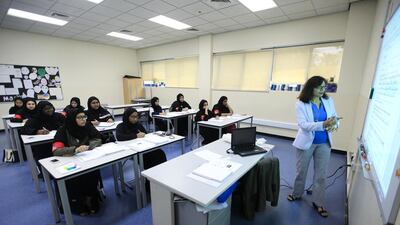A global shortage of high-quality teachers is one of the greatest challenges education faces today, a forum in Abu Dhabi heard on Sunday.
“The thing is that politicians and political leaders seldom call it what it is - which is a crisis - when it comes to the recruitment and the retention of teachers in education systems,” said Vikas Pota, chief executive of the Varkey Foundation.
Mr Pota was speaking as moderator of a panel discussion at Qudwa 2017 in Abu Dhabi. It focused on addressing what governments are doing to ensure countries deliver on the UN's Sustainable Development Goal 4, to ensure an inclusive and quality education for all by 2030.
Mr Pota, citing UNESCO figures, said nearly 69 million new teachers are needed to provide quality universal primary and secondary education by 2030.
“How are we going to recruit these teachers?” he asked the panel, which included Minister of State for Public Education Jameela Al Muhairi, Abu Dhabi Department of Education and Knowledge chairman Dr Ali Al Nuaimi and Julia Gillard, chair of the Global Partnership for Education and the former Australian prime minister.
“I think it’s actually a good moment in the history of education when we are facing such a profound crisis in learning and in the numbers of the teaching workforce to have a discussion about reimagining the teaching workforce,” said Ms Gillard.
Ms Gillard said the profession still carries a stigma that could be addressed by establishing clear definitions and career pathways for the various types of educators.
_____________
Read more:
Sheikh Abdullah heralds 'new era' of education
Emirati School Model will expand to UAE's international private schools, says minister
_____________
When people refer to an “educator,” for example, the term applies both to a PhD professional in Finland to an untrained teacher in a developing country. This broad label may be of the factors negatively affecting the overall reputation.
“I do think we can be a little bit more thoughtful about teaching workforce and if we did define what it is to be a teacher, what it is to be a master teacher, what it is to be a paraprofessional in the teaching workforce, what we mean when we talk about a teacher technologist," she said.
Greater recognition that a teacher is a literacy or numeracy specialist was one suggestion.
“I also think we could be creating a career pathway and a new era of respect for the status of teaching," she said.
Mr Pota said that a study published by the Varkey Foundation in 2013 found that with the exception of China, where “teachers are seen in the same status as doctors,” elsewhere teaching was regarded as a “middle to low-ranking social status profession.”
“How do we improve the status of teachers, because that, I think, is a very important step in recruiting the best and brightest into the profession,” Mr Pota asked Dr Al Nuaimi.
In a rousing speech, Dr Al Nuaimi spoke passionately about teachers taking ownership – and earning – their own elevated status through their work.
“My advice to the teachers, ‘You should not wait for the community to appreciate your role, you have to enforce this on the community, you have to let the community respect you. Earn this respect,’” he said to widespread applause.
“You have the ability to get in touch with people’s hearts and minds through the students that you are teaching to. Your interaction with parents is the easiest way to win their hearts and minds.
"Through your innovative and outstanding performance, everybody will respect you. You don’t have to beg for respect. You don’t have to wait for respect from anyone. You have to hold your head up high and have full confidence in yourself and this will impose on others respect in your and having full respect for you as teachers.”
Dr Al Nuaimi said teaching professionals should not allow their wages to define their status, but rather they should find intrinsic gratification in the intellectual challenge of the job.
“Unfortunately, many communities now look at the social status of teachers through the ability to earn money,” said Dr Al Nuaimi.
“The fact that you are shaping the hearts and minds of countless students, and you are shaping the future, therefore you are shaping a human being who can be an outstanding person or individual who can achieve success for himself or herself at the social level, at the family life level and at the professional level.
"It’s a priceless feeling that can not be evaluated in terms of money and financial gains because you have made this massive impact on [an] individual's life and turned him into an outstanding and successful individual. I hope that every single teacher would realise that they are shaping their own social status.”

